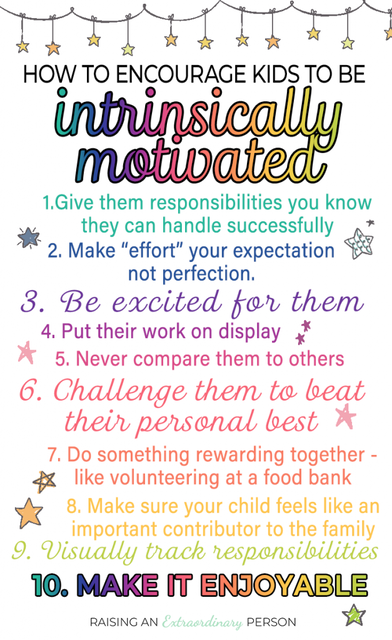Why is it so difficult to motivate my kids?Everyone needs help getting motivated sometimes. For adults, we might need help getting motivated to complete tasks at work or take care of household chores. This is no different for our children.
Often, the areas that we struggle with (whether it be doing the dishes or completing a math assignment) are the areas where we need a healthy dose of motivation. |
Try out some of the simple strategies listed below to help increase your child's motivation during remote learning
Start with Interests
"Build a bridge" from the things your child loves to school subjects that they don't love, yet. For example, if they love sports but dislike reading, try finding a graphic novel about soccer or another sport to spark their interest. If you're struggling to come up with ideas, reach out to your child's teacher - they have lots of ideas to help with this, too!
Presentation is Everything
How you present an activity makes a HUGE difference in how children feel about it. For younger children, framing tasks as games makes completing those tasks more fun. For example, need to sort the laundry? Challenge your child to a throwing contest of tossing clothes into the right piles. Or, let your child use pieces of cereal as manipulatives for math problems and eat them when they've finished a problem.
Use Natural Consequences
While it might be tempting to "reward" your child with screen time, that can actually set children up to see screens as a coveted commodity. Instead, try framing it as a timing issue. For example, "we have three hours in the evening, so if you try really hard on your school work and get everything finished, you'll have time to play your video game!"
You can incentivize effort and progress in any way that makes sense for your child. Talk explicitly with your child about what they would like to work for. Come up with ideas together, set benchmarks, and provide a lot of verbal praise along the way.
You can incentivize effort and progress in any way that makes sense for your child. Talk explicitly with your child about what they would like to work for. Come up with ideas together, set benchmarks, and provide a lot of verbal praise along the way.
Use your child's interests and get their inputIf there are gaps in your child's school day, remember that anything your child is interested in (e.g., dinosaurs, Minecraft, PawPatrol) can be used for learning! Read books, do math problems, and create science experiments related to their favorite topics.
When deciding how to structure the day, ask your child what he or she prefers. Try to incorporate their choices into the plan. For instance, if reading is the hardest subject for your child, would they rather do it first or last? Display WorkLet your child hang up their art work, worksheets, and other projects in your home. This helps to show them that you're proud of their work and increases their intrinsic motivation.
|
Give Detailed Praise
Instead of saying "good job," try giving specific praise about your child's work. If you know they tried hard, let them know how proud of them you are.
Some examples of specific, or detailed praising might be, "I love how nicely you're sitting and working" or, "Great job writing that sentence!" or, "I really like how you're using blocks to help you count." Detailed praise is all about complementing very specific actions that your child is doing well - whether it's sitting quietly and working, copying down their letters neatly, writing their name legibly, or following their schedule and routine. Bottom line - If you see something they're doing that you like - tell them!
Also, if your child is hard on themselves about their work, remind them that it's not about being "good" or "bad" at something, but always working towards getting better at it. The goal is not perfection, it's effort! Remind your child that if they tried their best, that's all that matters.
Some examples of specific, or detailed praising might be, "I love how nicely you're sitting and working" or, "Great job writing that sentence!" or, "I really like how you're using blocks to help you count." Detailed praise is all about complementing very specific actions that your child is doing well - whether it's sitting quietly and working, copying down their letters neatly, writing their name legibly, or following their schedule and routine. Bottom line - If you see something they're doing that you like - tell them!
Also, if your child is hard on themselves about their work, remind them that it's not about being "good" or "bad" at something, but always working towards getting better at it. The goal is not perfection, it's effort! Remind your child that if they tried their best, that's all that matters.
Be Honest
For older children, try having an honest conversation about taking on more responsibility because they're getting older and more mature. Your child might surprise you by rising to the challenge.
Sources:
https://www.commonsense.org/education/articles/parent-tips-and-tricks-for-distance-learning
https://www.commonsense.org/education/articles/parent-tips-and-tricks-for-distance-learning


